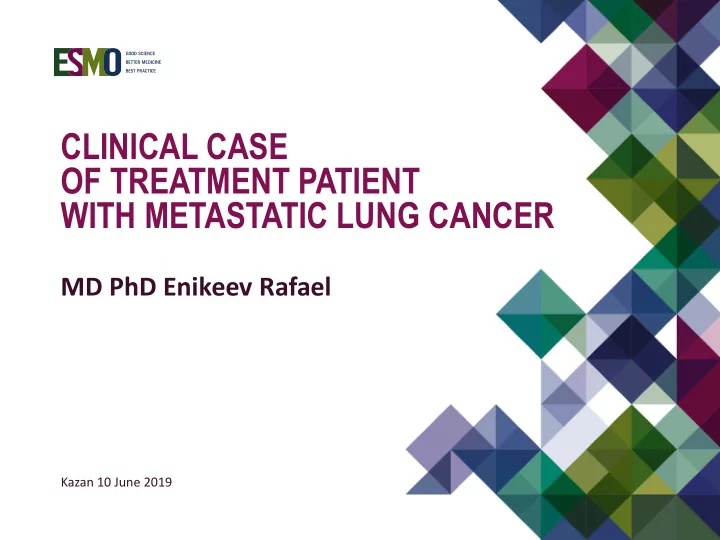

CLINICAL CASE OF TREATMENT PATIENT WITH METASTATIC LUNG CANCER MD PhD Enikeev Rafael Kazan 10 June 2019
CONFLICT OF INTEREST DISCLOSURE No conflict of interest to mention.
PATIENT K., 1949 Sub-title Chest CT scan on the 06/26/15 : Focal lesions of the upper lobe of the left lung. Enlarged intrathoracic lymphatic nodes. Left-sided hydrothorax. Hydropericardium. The lymph nodes of the neck in the lower third are anechoic to 24x12 mm on the right, 14x10 mm on the left, and not in the upper and middle third. The EGFR mutation analysis of cytological blocks and blood plasma : L858R mutation was detected. Diagnosis : Cancer pulmonis sinistrae T4NxM1. PS : ECOG - 2.
Treatment strategy? • Chemotherapy • Target therapy with 1 st generation TKIs • Perform further examination • Best supportive care Abbreviations: TKI – tyrosine kinase inhibitor
It was decided to start target therapy with gefitinib. After 1 month of therapy EGFRm test in plasma (04.2015) : both L858R and T790M - negative. 3 month on therapy. Chest CT scan (08.2015) : Partial response by RECIST criteria (50% reduction). The duration of gefitinib treatment - 12 months. 08.2016 - plasma EGFRm test : L858R positive, T790M – negative. 08.2016 CT scan of the chest, abdominal organs, lymph nodes : stable disease. Abbreviations: EGFR – epidermal growth factor receptor
Treatment strategy? • Chemotherapy • Continue target therapy • Perform further examination (brain MRI)
Brain MRI : multiple (more than 10) scattered moderately vascular soft tissue lesions the largest: in the right frontal lobe 5x4 mm, in the left frontal lobe 6x5 mm, in the left cerebral peduncle 8x6 mm. Treatment strategy? • Chemotherapy • Continue target therapy • Radiotherapy • Radiotherapy + target therapy • Best supportive care
Whole brain radiotherapy (WBRT) was conducted (30 Gy); target therapy continued (gefitinib).
SUBTYPING PROGRESSIVE DISEASE Continue TKI’s New TKI’s Chemotherapy + continue TKI Combinations of targeted drugs Local therapy + continue TKI Abbreviations: CNS = central nervous system; PD = progressive disease, TKI – tyrosine kinase inhibitor Gandara DR, Li T, Lara PN, et al. Acquired resistance to targeted therapies against oncogene-driven non-small-cell lung cancer: approach to subtyping progressive disease and clinical implications. Clin Lung Cancer . 2014;15(1):1–6. doi:10.1016/j.cllc.2013.10.001
MRI and CT of the brain, Treatment strategy? November 2016 : stable disease. Plasma test for EGFR mutation : both L858R and • Target therapy T790M - negative. • Chemotherapy CT, February 2017 : disease progression - growth of previously described lesions and the appearance of pleurisy. MRI of the brain : stable disease. The duration of target therapy is 18 months.
From March to October 2017: 6 courses of chemotherapy (EP) were conducted. Stable disease was achieved after 2 courses Stable disease after 6 courses. Stable disease 10.2017 until 01.2019.
Treatment strategy? CT scan of the chest and neck, January 2019: stable disease. • Target therapy MRI of the brain : disease • Chemotherapy progression (the emergence of new foci). • Radiotherapy Plasma test for EGFR mutation , August 2018: L858R and T790M positive.
02.2019 – therapy with 3 rd generation TKI was started.
SAMPLE CHART SLIDE Reference
FINDINGS • The objective response to gefitinib therapy correlated with the disappearance of EGFR activating mutations in the blood plasma and may serve as a marker of the effectiveness of TKI therapy in advanced NSCLC. • The reappearance in plasma of EGFR activating mutations and/or T790M may be one of the predictors of disease progression.
Reference
Recommend
More recommend